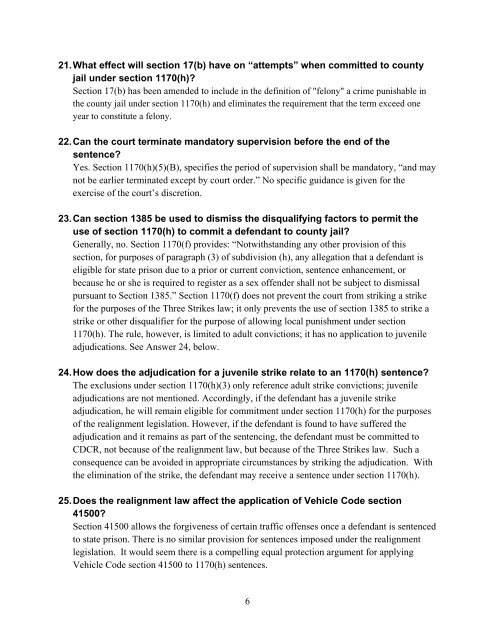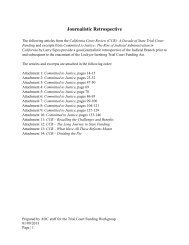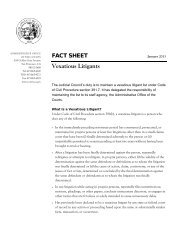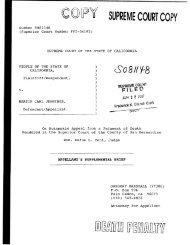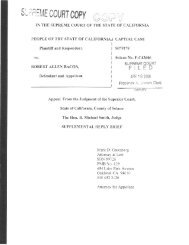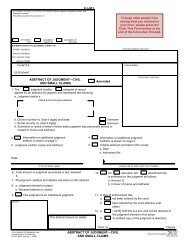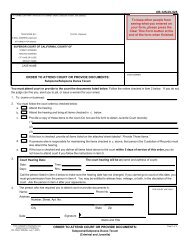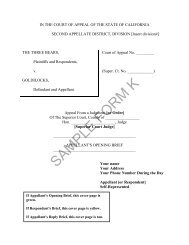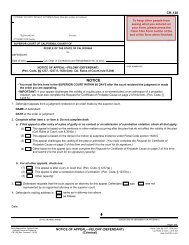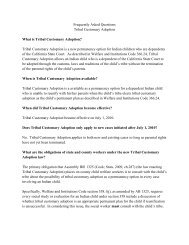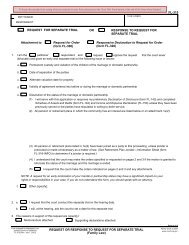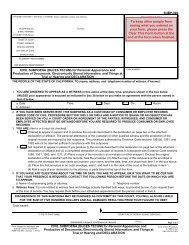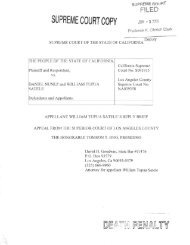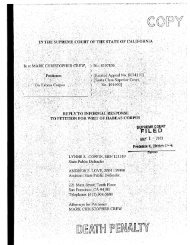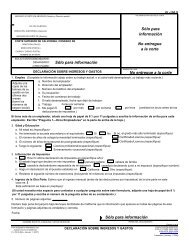2011 Criminal Justice Realignment Act ... - California Courts
2011 Criminal Justice Realignment Act ... - California Courts
2011 Criminal Justice Realignment Act ... - California Courts
You also want an ePaper? Increase the reach of your titles
YUMPU automatically turns print PDFs into web optimized ePapers that Google loves.
21. What effect will section 17(b) have on “attempts” when committed to county<br />
jail under section 1170(h)?<br />
Section 17(b) has been amended to include in the definition of "felony" a crime punishable in<br />
the county jail under section 1170(h) and eliminates the requirement that the term exceed one<br />
year to constitute a felony.<br />
22. Can the court terminate mandatory supervision before the end of the<br />
sentence?<br />
Yes. Section 1170(h)(5)(B), specifies the period of supervision shall be mandatory, “and may<br />
not be earlier terminated except by court order.” No specific guidance is given for the<br />
exercise of the court’s discretion.<br />
23. Can section 1385 be used to dismiss the disqualifying factors to permit the<br />
use of section 1170(h) to commit a defendant to county jail?<br />
Generally, no. Section 1170(f) provides: “Notwithstanding any other provision of this<br />
section, for purposes of paragraph (3) of subdivision (h), any allegation that a defendant is<br />
eligible for state prison due to a prior or current conviction, sentence enhancement, or<br />
because he or she is required to register as a sex offender shall not be subject to dismissal<br />
pursuant to Section 1385.” Section 1170(f) does not prevent the court from striking a strike<br />
for the purposes of the Three Strikes law; it only prevents the use of section 1385 to strike a<br />
strike or other disqualifier for the purpose of allowing local punishment under section<br />
1170(h). The rule, however, is limited to adult convictions; it has no application to juvenile<br />
adjudications. See Answer 24, below.<br />
24. How does the adjudication for a juvenile strike relate to an 1170(h) sentence?<br />
The exclusions under section 1170(h)(3) only reference adult strike convictions; juvenile<br />
adjudications are not mentioned. Accordingly, if the defendant has a juvenile strike<br />
adjudication, he will remain eligible for commitment under section 1170(h) for the purposes<br />
of the realignment legislation. However, if the defendant is found to have suffered the<br />
adjudication and it remains as part of the sentencing, the defendant must be committed to<br />
CDCR, not because of the realignment law, but because of the Three Strikes law. Such a<br />
consequence can be avoided in appropriate circumstances by striking the adjudication. With<br />
the elimination of the strike, the defendant may receive a sentence under section 1170(h).<br />
25. Does the realignment law affect the application of Vehicle Code section<br />
41500?<br />
Section 41500 allows the forgiveness of certain traffic offenses once a defendant is sentenced<br />
to state prison. There is no similar provision for sentences imposed under the realignment<br />
legislation. It would seem there is a compelling equal protection argument for applying<br />
Vehicle Code section 41500 to 1170(h) sentences.<br />
6


